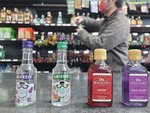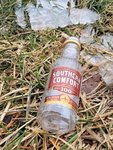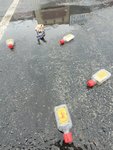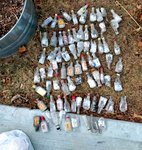The snow had been plowed recently, so the nip bottles were fresh.
Four tiny vessels of Fireball cinnamon whiskey were downed and dropped outside a Johnston restaurant. They formed a rough circle …
This item is available in full to subscribers.
We have recently launched a new and improved website. To continue reading, you will need to either log into your subscriber account, or purchase a new subscription.
If you are a current print subscriber, you can set up a free website account by clicking here.
Otherwise, click here to view your options for subscribing.
Please log in to continue |
|






The snow had been plowed recently, so the nip bottles were fresh.
Four tiny vessels of Fireball cinnamon whiskey were downed and dropped outside a Johnston restaurant. They formed a rough circle among the shallow puddles on the pavement. Imagine what’s under the snow.
Near the curb, a miniature 100-proof Southern Comfort bottle emerged from the frost and ice, likely tossed by a passing car.
The littered nips lurk everywhere — in the parks, the sidewalks, the grass, the bushes, the ponds, the streams, the rivers, and ultimately, the ocean.
It’s a common bit of rubbish around Johnston and other Ocean State communities.
Nip opponents would like to pass statewide legislation banning the itty-bitty booze bottles. Some liquor-selling businesses have objected to the proposed law.
Others, like Norm Hale, owner of Market Beer Wine Spirits in Johnston, see both pros and cons to the eradication of nips.
“I don’t think it will be a financial hardship,” Hale said, standing near the counter of his 11 Commerce Way store in the plaza next to Stop & Shop. “It might hurt business owners with stores on the border (with other states) more than me.”
Baskets full of nips hang on the wall behind the counter — flavors like grape, watermelon, cherry. Whiskey. Vodka. Rum.
They Add Up
George Shuster knows Johnston, Cranston, Warwick and other communities have a problem with litter. He feels miniature alcohol bottles, known as “nips,” make up a far too high percentage of scattered Ocean State debris.
Legislation has been recently introduced to ban them in the state, and Shuster hopes it may help to solve the problem at least to some degree.
“If you could get rid of alcohol beverage containers as litter in (Warwick) you would get rid of most of the litter,” said Shuster.
Shuster is no stranger to doing his part to help the environment. He is the Vice President of the Rocky Point Foundation, and played a key role in getting an open space bond on the state ballot to purchase the park.
In 2014 he helped to form Pick Up Warwick, which is an informal Facebook group with a goal of encouraging the Warwick community to pick up litter throughout the city.
Community members who pick up litter post photos to the Facebook page as a way to encourage others to do the same. Since forming, Shuster said the group has collectively picked up thousands of pounds of trash.
Recently Pick Up Warwick put a challenge out on Facebook asking members of the community to pick up as many nips as they can in 11 days. In total 1,517 nips were collected from Warwick. Pick Up Warwick donated $1,000 to Save The Bay.
In November 2018, Pick Up Warwick led a similar effort and collected 3,166 nips in Warwick. It led to a $3,166 donation to Save the Bay.
Shuster said South Kingstown has also started a group after hearing about Pick Up Warwick. Pick Up South Kingstown collected more than 3,000 nip bottles and is planning to bring them to the State House during the next Committee meeting discussing the nips legislation as a symbolic gesture.
The Legislation
The legislation, which was introduced by State Rep. David Bennett, would ban nip bottles all together in the Rhode Island. The only exceptions allowed would be for trains and airlines passengers “as long as the containers are collected prior to passengers disembarking off the train or aircraft.”
“We are the Ocean State, and unfortunately, litter that pollutes our streets and land often does double duty by winding up in our waterways and the bay, harming wildlife,” said Bennett. “But we don’t need to stand for it. There are many tools available to us that can be very effective at cutting down on both litter and waste in our landfill, and it’s up to us to get to work implementing them.”
Bennett said he first became aware of the problem after the Department of Transportation cut down brush along Gorton Pond at his request. He said that he instantly thought it was beautiful and people could walk there and take in a great view.
“And then I spotted it,” Bennett said about the nip bottles discovered all around the area. He said it wasn’t just a couple of them — there were a lot of them.
In addition to the environmental impacts from the legislation, Bennett said that he feels that drinking and driving may be reduced from it. He said that right now people are able to easily conceal the miniature bottles and dispose of them easily when they are done.
“The biggest thing with this bill is the drinking and driving,” said Bennett.
Hale agreed with the sentiment behind the legislation.
“There’s no question nips contribute to litter and drunk driving,” Hale said in the back stockroom of his Johnston store. “It can also be harmful to restaurants and bars.”
Bar and restaurant patrons have been known to sneak nips into establishments to increase impairment but decrease the bar bill.
“Like everything else, it’s a mixed bag,” Hale said. “Nips have grown into a significant portion of business over the past 10 years.”
The Opposition
During a recent House Environment and Natural Resources Committee meeting, of which Bennett is the Chairman, some liquor stores testified against the ban, including Ruxi Dudhia, the owner of Conimicut Liquors.
“It is shortsighted to ban one product in an attempt to curb the state’s litter problem and changing the size of a bottle will unfortunately not prevent someone from drinking and driving,” said Dudhia. “The problems that you are attempting to solve with this bill are too big to be managed by getting rid of one product type.”
Bennett said other states have enacted bans on nips. In Massachusetts the Attorney General put out guidance, which will allow each town in the State to decide if they want to ban them as of May 11. He said that the bordering towns like Attleboro have not yet decided on a ban at this time.
Dudhia said that she is also concerned that patrons who normally went to his and other local stores for nips will now go a few minutes further to Massachusetts for their alcohol purchases, meaning a loss in revenue for Rhode Island stores.
“A ban on nips would also hurt small business owners like me,” Dudhia said. “Nips account for up to 25 percent of alcohol sales in Rhode Island and a ban could result in serious loss of revenue while we are still trying to recover after a challenging few years. I am also worried that we will lose our customers to out-of-state competitors. If nips are banned in Rhode Island it would be easy for customers to cross state lines and purchase their nips elsewhere, which will hurt the state’s economy. This is the case in Massachusetts, where a few localities banned nips and sales simply moved to neighboring towns.”
Bennett said that he has also heard from bar owners who feel that patrons are concealing them and making their own mixed drinks while at their establishments. He said the feedback he got from the owners is that the legislation would be good for their businesses.
Win or Lose
This isn’t the first time Bennett has tried to tackle the empty nip bottle problem. Last year he introduced legislation requiring a 50-cent deposit on nips bottles and requiring retailers and redemption centers to take them in and then return them to bottlers.
But Bennett said he received pushback from liquor store owners who thought that system would be too strenuous, which led Bennett to introduce the bill to ban nips all together.
Bennett said that if liquor stores came out and said they would be willing to go with the deposit instead of the ban, he “would be willing to work with that.” He said he would have to talk to his colleagues that co-sponsored the bill and those on the Committee as well.
“I’m willing to listen,” said Bennett.
Shuster said whether or not the legislation passes this year, Bennett’s legislation it is forcing a conversation on the issue at the State House.
Ultimately Bennett hopes that the legislation will reach the floor for a vote. He said he doesn’t plan on holding the Bill.
“I would rather get it defeated and shelved,” said Bennett.
As a liquor store owner, Hale saw another benefit to the legislation.
“The biggest pro: the price of nips hasn’t gone up in over a decade,” Hale said. “People buy nips because they think it’s the cheapest price per ounce. But people figure things out. If they get rid of ’50 ML’s’ — nips — they’ll probably start making ‘100 ML’s.’ People will just go up to the next biggest bottle.”
Comments
No comments on this item Please log in to comment by clicking here